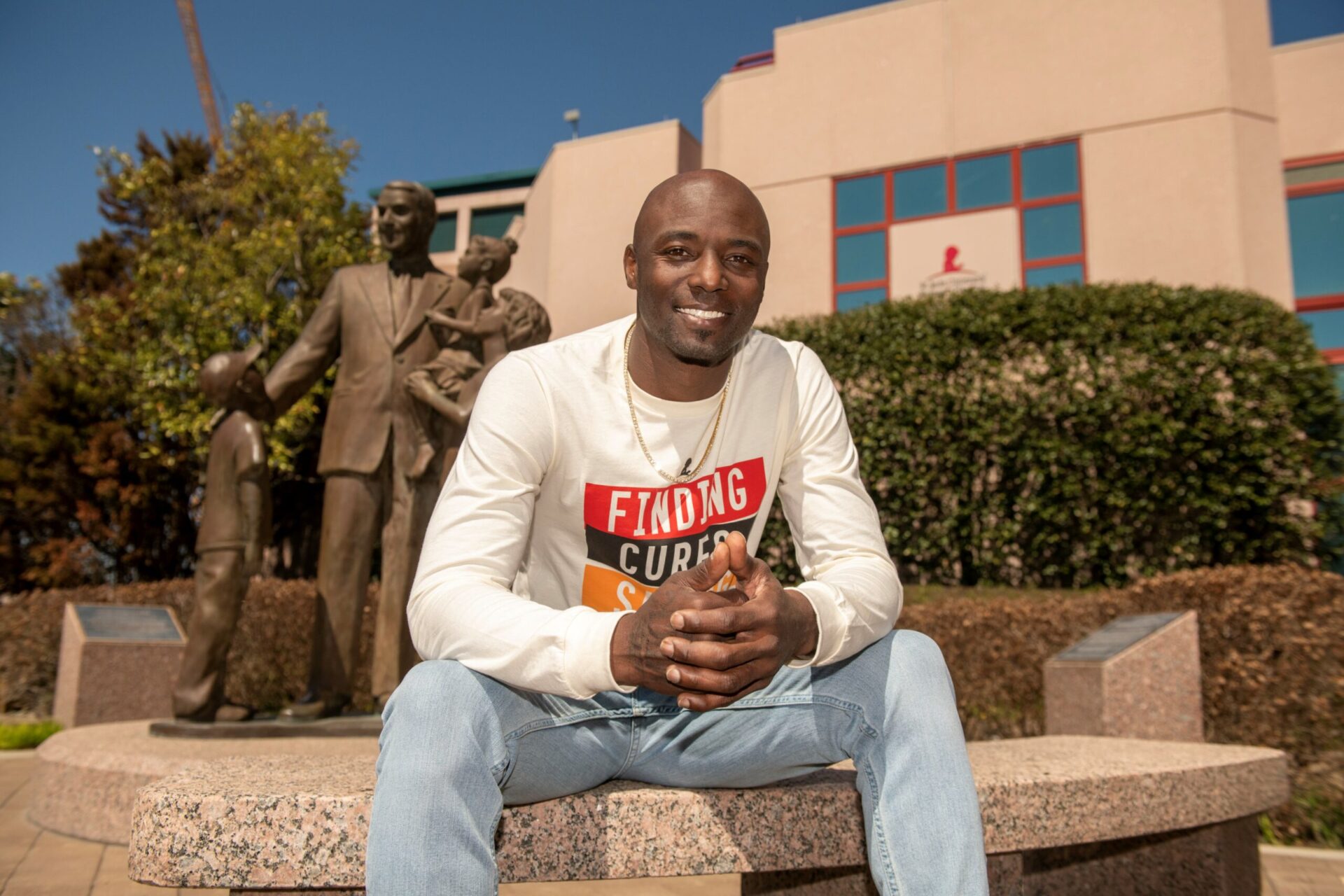
July 19, 2023
Santonio Holmes Turns Trials Into Triumph And Spreads A Message Of Advocacy For Those Living With Sickle Cell Disease
Former Pittsburgh Steelers wide receiver Santonio Holmes has encountered many wins, from being a first-round draft pick to helping his team secure a Super Bowl championship, subsequently, being named Super Bowl XLIII MVP. Although his athleticism on the field is widely known, since retiring from the game on Oct. 10, 2017, winning off the field has taken on an entirely new meaning. His connection to sickle cell disease through his oldest son, who lives with the condition, ignited his focus on raising awareness to spread a message of advocacy, as nearly 1 in 13 Black babies carry the sickle cell trait (SCT).
BLACK ENTERPRISE caught up with Holmes to discuss key moments from his career, his life post-NFL, and using his platform to educate the Black community on ways to become more involved in supporting those living with sickle cell disease.
What does it mean to you to have a longstanding partnership with St. Jude Children’s Research Hospital and raise awareness around sickle cell disease?
Santonio Holmes: It’s a blessing and an opportunity to use a voice given to me through the NFL for becoming a Super Bowl MVP and having such an impact that was near and dear to my heart, which was sickle cell disease—and having a son that was born with the condition where he could not play any sports growing up. I knew how hard it was for kids living with the condition to be able to survive in our world today.
As I continued to research and educate myself on sickle cell, St. Jude became one of those faces that popped up constantly. You would see all the infomercials about how you could save and change a kid’s life by donating. I used to overlook those commercials as a kid. Once I realized that it became a serious issue in my life, I wanted to be a voice for people who had no opportunity.
What is the most significant barrier to people’s understanding of sickle cell?
There needs to be more knowledge and understanding of how it affects the people living with the condition. Living with sickle cell can be difficult for many people who are anemic, suffering from being out in the heat too long, or understanding that they can’t play sports as frequently as most people can. They get tired quickly and very cold instantly.
There is no cure at this moment. To know that sickle cell is a fighting disease in our community, we need to be more aware of how we can go out and support by donating blood so that our kids and patients can receive blood transfusions from more African Americans. That’s one of the biggest things I’ve been most concerned about.
View this post on Instagram
Thank you for sharing that with our audience. I want to shift gears and discuss your career. What would you say was the most difficult decision you had to make to pursue your destiny of becoming a Pittsburgh Steelers wide receiver and Super Bowl MVP?
Understanding the process and what it takes to change because, for many people in our world, we are stuck in our ways. We like the things we like, but understanding that when you allow yourself to grow through those changes, it’s God’s way of showing you how prosperous you can be. I’ve accepted all of those changes in my life. For instance, I left my son to play college ball at Ohio State from Florida. I had to make that sacrifice, and I understood that my preparation prepared him for a better life because I took on those chances of wanting to change.
What do you mean to the Steelers’ culture and the overall fabric of the organization?
Wow. First of all, I’m just thankful for having a dream and wanting to play for the Pittsburgh Steelers when I was a kid. They gave me an opportunity to be drafted there, and I’m very blessed to have teammates with a winning culture that wanted to win Super Bowls.
Speaking of winning, what does it mean to win in life, both on and off the field?
To win on and off the field in life is to support the people around you that surround you in the field of focus you’re involved with. Whether it’s sports, business, being a nurse, a caregiver, or an animal lover. Be more consistent in helping those people to help you. That’s just a part of the journey we learn to live when we are involved in a culture like Pittsburgh.
Since your retirement, what have you missed the most about the game or being in the league?
I would probably say the sign language because as I continue to live out these days of missing the game, it was the silence we created among ourselves and the language we had that we communicated to each other in the way that we understood what needed to be done. One of the things I miss the most is building that relationship with my teammates that was in code because of your surroundings of being in the atmosphere where people and eyes are always around you. You had a way of communicating, which gave me a better understanding and support for being a part of the game.
When people hear Santonio Holmes’ name for generations to come, what’s the first thing you want to come to their minds?
Respect. Just being who I am, wanting to be a person in the world that could support so many other people, and having a goal, love, and passion for people. Gaining and earning respect is something I’ve always tried to be able to deliver when I’m around people.
RELATED CONTENT: Faces of Sickle Cell: NFL Player Tevin Coleman and Wife Akilah Connects Black Community With Sickle Cell Resources